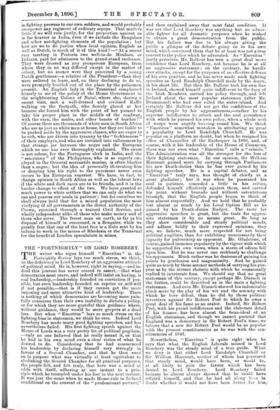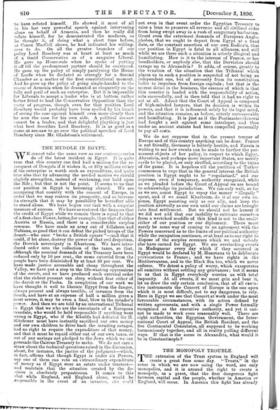THE " FORTNIGHTLY " ON LORD ROSEBERY. T HE writer who
signs himself " Emeritus " in the Fortnightly Review lays too much stress, we think, on the deficiency in Lord Rosebery of an aggressive attitude of political mind. He is, however, right in saying,—and in- deed this journal has never ceased to assert, —that what democracies most crave, and indeed will insist on having, is real leadership,—leadership founded on conviction if pos- sible, but even leadership founded on caprice or self-will if not possible,—that is if they cannot get the more imposing and more attractive kind of leadership. There is nothing of which democracies are becoming more pain- fully conscious than their own inability to dictate a policy, or for which they are more grateful than guidance where, without guidance, they would be mere gropers at a dead loss. But when " Emeritus " lays so much stress on the fighting bias in statesmen, we think he errs. Indeed Lord Rosebery has made many good fighting speeches, and has nevertheless failed. His first fighting speech against the House of Lords was a very pretty bit of political pugilism, —only no one believed that be really meant it, or that he had in his own mind even a clear vision of what he desired to do. Considering that he had commenced his leadership by declaring himself very strongly in favour of a Second Chamber, and that he then went on to propose what was virtually at least equivalent to abolishing the Second Chamber for all practical purposes, the people felt, and felt truly, that here was a mind at odds with itself, adhering at one instant to a prin- ciple which he trampled under his feet in the next instant. It was just the same when he made Home-rule in Ireland conditional on the consent of the " predominant partner," and then explained away that most fatal condition. It was not that Lord Rosebery was anything but an admir- able fighter for all dramatic purposes when he wished to obtain a great demonstration from the public. But his failure was due to his always giving the public a glimpse of the debate going on in his own mind, which convinced them that he at least was not a true convert to the policy which he advocated. As " Emeritus justly perceives, Mr. Balfour has won a great deal more confidence than Lord Rosebery, not because he is at all an aggressive statesman ; on the contrary, he hardly ever attacks, except for the purposes of an effective defence of his own position, and he has never made such lighting speeches as Lord Randolph Churchill made by the dozen, in his short life. But then Mr. Balfour took his own line in Ireland, showed himself quite indifferent to the fury of the Irish Members, carried his policy through, and left Ireland about the most popular statesman (after Mr. Drummond) who had ever ruled the sister-island. And certainly Mr. Balfour did not get the confidence of the English people by his aggressiveness,—rather by his supreme indifference to attack and the cool persistency with which he pursued his own policy, when a whole nest of wasps were angrily buzzing round him. We think " Emeritus" somewhat mistaken in attributing so great a popularity to Lord Randolph Churchill. He was popular on a platform no doubt, but when he resigned his office of Chancellor of the Exchequer in 1886, and, of course, with it his leadership of the House of Commons, there was not even what " Emeritus " calls a " crisicle." The Administration was all the stronger for the loss of their fighting statesman. In our opinion, Sir William Harcourt gained more by carrying through Parliament his new Death-duties than he has ever gained by his fighting speeches. He is a capital debater, and as " Emeritus " truly says, was thought of chiefly as a great gladiator ; but it was when he possessed his soul in patience, conceded a little to his critics, defended himself effectively against them, and carried his point without bravado and without ostentatious triumph, that the English people began to think of him almost respectfully. And we hold that he probably lost almost as much by his Local Option Bill as he gained by his Death-duties Budget. The taste for aggressive speeches is great, but the taste for aggres- sive statesmen is by no means great. So long as they show considerable and steady political minds, and adhere boldly to their expressed opinions, they are, we believe, much more respected for not being political pugilists, than for exhibiting unnecessarily their capacity for pulverising an opponent. Mr. Gladstone, of course, gained immense popularity by the vigour with which he supported his own views, when a storm of odium fell upon him. But he was never one recklessly to challenge his opponents. Much rather was he desirous of gaining his points by gentleness and magnanimity. And he gained quite as much by those serener methods of carrying his pur- pose as by the sterner rhetoric with which he occasionally replied to inveterate foes. We should say that no great statesman of this century, except perhaps Mr. Disraeli in the forties, could be described as in the main a fighting statesman. And even Mr. Disraeli showed his indomitable pluck more by the play of his wit and the serenity with which he bore defeat, than he did by those political invectives against Sir Robert Peel to which he owes .a great deal of his fame as an orator. Indeed, Sir Robert Peel, with his proud indifference and the elaborate detail of his finance, has been almost the beau-ideal . of an English statesman, and though we cannot pretend that England was a democracy in Sir Robert Peel's time, we believe that a new Sir Robert Peel would be as popular with the present constituencies as he was with the con- stituencies of 1841.
Nevertheless, " Emeritus " is quite right when he says that what the English Liberals missed in Lord Rosebery was the steady mind of a true guide. What we deny is that either Lord Randolph Churchill or Sir William Harcourt, neither of whom has possessed that steady mind, would have been, or would be, at all likely to gain the favour which has been denied to Lord Rosebery. Lord Rosebery failed because he almost always showed that he could have refuted himself, and that he had all along been in doubt whether it would not have been better for him, to have refuted himself. He plumed it most of all in his last very powerful speech against intervening alone on behalf of Armenia, and then he really did refute himself, for he demonstrated the madness, as he thought it, of doing what a short time before, as Canon MacColl shows, he had indicated his willing. ness to do. On all the greater branches of our policy Lord Rosebery was at heart at least as much of a timid Conservative as of a sanguine Liberal. He gave up Home-rule when he spoke of putting it off till the predominant partner should be convinced. He gave up the policy of simply paralysing the House of Lords when he declared so strongly for a Second Chamber as a matter of the first constitutional moment. And he gave up the policy of going single-handed to the rescue of Armenia when he descanted so eloquently on the folly and peril of such an enterprise. But it is impossible for Liberals to accept a leader who is at bottom rather better fitted to lead the Conservative Opposition than the party of progress, though even for that position Lord Rosebery would probably have been spoiled by his knack of seeing the case against himself even more clearly than he sees the case for his own side. A political see-saw cannot be a leader, and that delightful plaything is just what best describes Lord Rosebery. It is as good as a game at see-saw to go over the political speeches of Lord Rosebery since Mr. Gladstone's retirement.























































 Previous page
Previous page